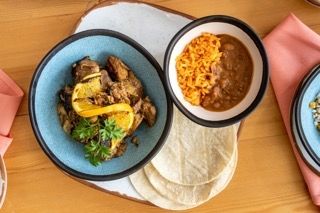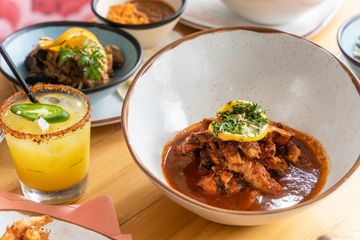Enjoy flavorful freshly made guacamole during special events
Is Mexican Food Healthy And Balanced? Unboxing the Nutritional Conveniences of Conventional Ingredients
The question of whether Mexican food is healthy and balanced welcomes an exploration of its typical ingredients. Beans and corn function as foundational staples, abundant in protein and fiber. Avocados supply helpful fats, while various herbs and seasonings add taste and health advantages - New York Times rated. With each other, these parts create a tapestry of nourishment. The healthfulness of Mexican food typically depends on preparation techniques and part dimensions. What role do these aspects play in identifying its total nutritional worth?
The Power of Beans: Healthy Protein and Fiber-Rich Staples
Although often ignored, beans work as a keystone of Mexican food, providing a wide range of dietary advantages. Rich in healthy protein, they are an excellent plant-based alternative for those seeking to satisfy their dietary healthy protein needs. This high protein material sustains muscular tissue repair and growth, making beans important for both vegetarians and meat-eaters alike. In addition, beans are an extraordinary resource of nutritional fiber, which helps in digestion and promotes a feeling of fullness, possibly helping with weight administration.
The range of beans made use of in Mexican meals, such as black beans, pinto beans, and kidney beans, adds to a varied taste account and can boost meals nutritionally. Beans are low in fat and have vital vitamins and minerals, including folate, magnesium, and iron. Together, these qualities make beans a vital component, supplying both nourishment and food in traditional Mexican price.

Corn: a Versatile Grain With Nutritional Benefits
Corn stands apart as a flexible grain basic to Mexican food, celebrated not just for its culinary applications yet additionally for its impressive dietary profile. As a key component in recipes like tortillas, tamales, and pozole, corn supplies important nutrients that add to a well balanced diet. Rich in carbs, it functions as a substantial energy resource, while likewise being reduced in fat, making it a positive choice for numerous dietary demands.
Corn is a great source of dietary fiber, which helps in food digestion and promotes satiation. It consists of considerable quantities of vitamins such as B-complex vitamins, which are important for basal metabolism. The existence of anti-oxidants, especially carotenoids, adds to overall wellness by reducing oxidative stress. Additionally, corn is gluten-free, dealing with those with gluten sensitivities. On the whole, the nutritional advantages of corn emphasize its importance in typical Mexican food and its function in a healthy diet.
Avocados: Healthy And Balanced Fats and Nutrients in Every Bite
Avocados play a considerable function in Mexican food, matching recipes with their luscious texture and abundant taste. Past their cooking appeal, avocados are commemorated for their remarkable dietary profile. They are a rich resource of healthy monounsaturated fats, which can aid lower poor cholesterol levels and assistance heart wellness. In addition, avocados are loaded with vital vitamins and minerals, consisting of potassium, vitamin E, and B vitamins, adding to overall health.
The high fiber material in avocados aids food digestion and advertises satiety, making them irish pub near me a beneficial addition to any dish. Their unique nutrient structure can additionally support skin wellness and provide anti-inflammatory benefits. Integrating avocados right into standard Mexican meals or enjoying them as a standalone snack can enhance both flavor and nutrition, demonstrating why they are a beloved staple in Mexican food. Overall, avocados supply a tasty means to enjoy healthy fats and essential nutrients in every bite.

Seasonings and Herbs: Flavorful Wellness Boosters
While taking pleasure in the rich tastes of Mexican cuisine, one can not neglect the crucial duty that spices and herbs play in improving both preference and health and wellness. Active ingredients such as oregano, cilantro, and chili peppers not only contribute to the vivid taste profile but likewise give considerable wellness advantages. Cilantro is known for its cleansing homes, assisting to get rid of heavy steels from the body, while oregano is packed with antioxidants and possesses anti-inflammatory effects.
Chili peppers, a staple in numerous Mexican recipes, have capsaicin, which has actually been linked to improved metabolic rate and discomfort alleviation. Additionally, flavors like cumin and coriander support food digestion and may aid in blood sugar policy. Incorporating these tasty health boosters right into meals not just enhances the cooking experience but additionally advertises total wellness, making Mexican cuisine not just scrumptious, however also nutritionally helpful.
Typical Cooking Approaches: Enhancing Nourishment and Flavor
Conventional cooking approaches in Mexican food play a vital duty in improving both nutrition and taste, as they commonly focus on time-honored strategies and fresh components. Methods such as nixtamalization, where corn is soaked and cooked in an alkaline option, not just improve the nutrient account of tortillas yet also boost their digestibility - hand crafted margarita. Furthermore, the use of sluggish food preparation techniques, like cooking or braising, allows flavors to meld magnificently while preserving the integrity of the active ingredients

Often Asked Questions
Are Mexican Food Portions Typically Larger Than Various Other Cuisines?
Mexican food sections are often larger than those of lots of various other cuisines. This particular mirrors typical dining techniques, stressing common sharing and hearty dishes, which can cause a more considerable offering dimension on the whole.
How Does the Preparation Technique Affect Healthiness of Mexican Food?
Preparation approaches considerably influence the healthfulness of Mexican food. Strategies such as barbecuing or steaming protect nutrients, while frying can increase unhealthy fat her explanation material. Options of components and cooking designs ultimately establish overall nutritional worth.
Can Mexican Food Be Customized for Particular Nutritional Restrictions?
Mexican food can indeed be customized for specific dietary restrictions. Replacements, such as making use of corn tortillas for gluten-free diet regimens or including even more veggies, enable individuals to appreciate typical flavors while fitting numerous nutritional demands.
What Are Usual Misconceptions Concerning Mexican Food and Wellness?
Common mistaken beliefs about Mexican food include the belief that it is inherently unhealthy, extremely hot, and entirely concentrated on fats. In truth, conventional meals commonly include nutritious active ingredients and can be tailored to numerous dietary requirements.
Are There Healthier Alternatives at Mexican Dining Establishments?
Healthier choices at Mexican dining establishments typically consist of smoked meats, beans, and fresh vegetables. Selecting dishes that highlight whole ingredients and staying clear of hefty sauces can cause an extra nourishing dining experience, advertising total health.
The range of beans made use of in Mexican recipes, such as black beans, pinto beans, and kidney beans, contributes to a varied taste profile and can improve dishes nutritionally. Avocados play a substantial function in Mexican food, matching meals with their creamy structure and abundant taste. Including avocados right into standard Mexican meals or appreciating them as a standalone snack can enhance both flavor bawarchi biryani and nutrition, showing why they are a cherished staple in Mexican food. While enjoying the abundant tastes of Mexican food, one can not ignore the vital role that spices and natural herbs play in enhancing both taste and health and wellness. Standard cooking approaches in Mexican cuisine play a necessary role in enhancing both nourishment and flavor, as they often prioritize time-honored methods and fresh components.